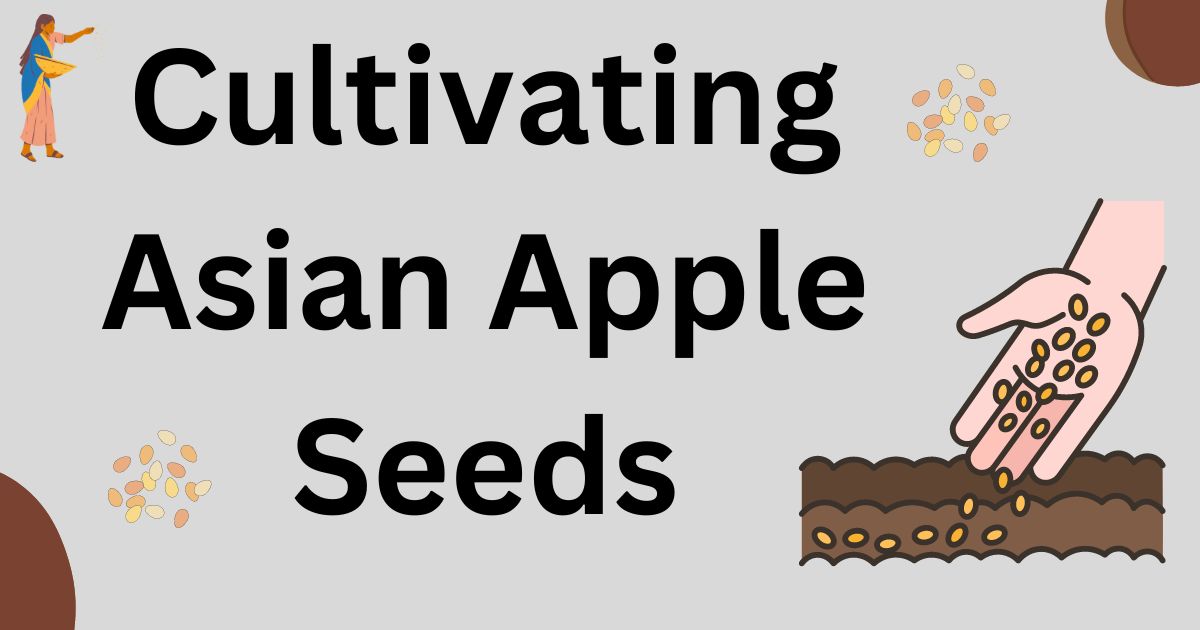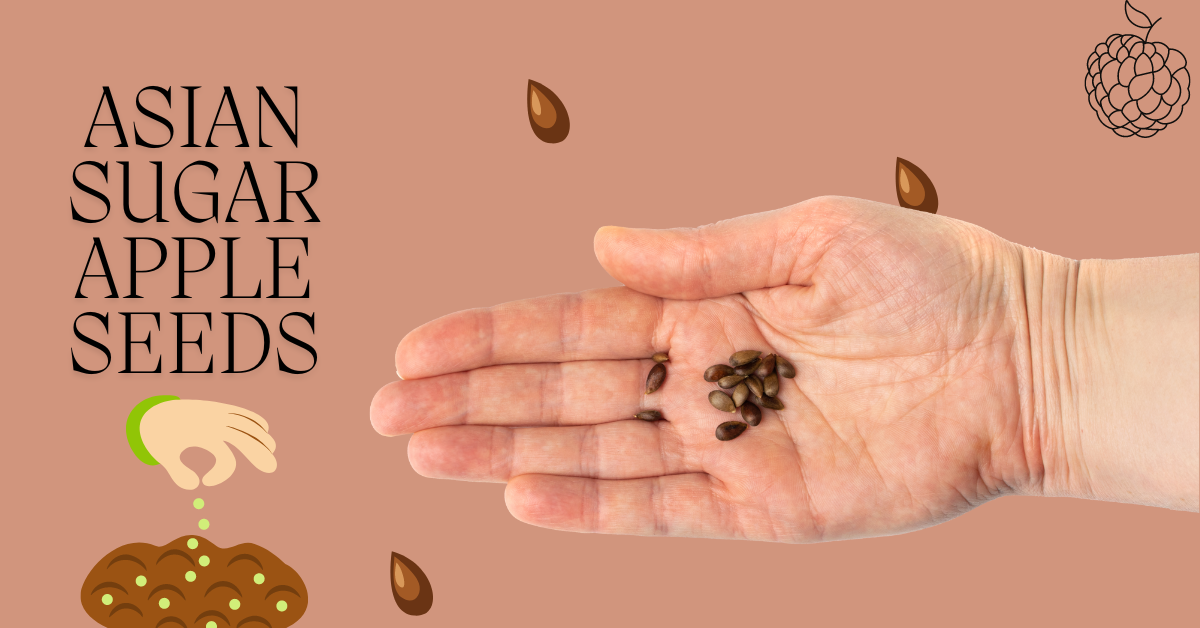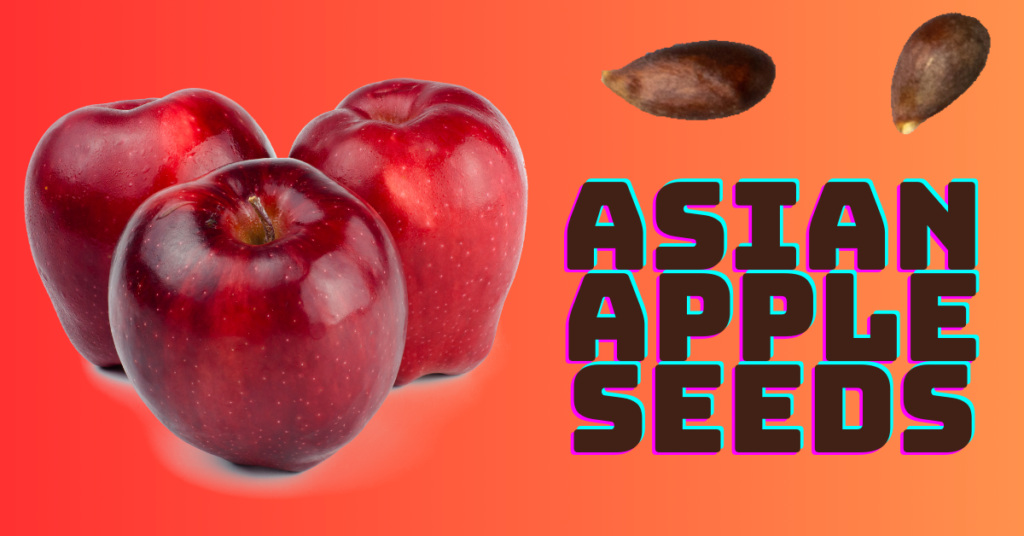In the realm of agriculture and horticulture, the term “Asian apple seed” often generates curiosity. What exactly does it involve? Is it a botanical wonder or a cultural reference?
In this comprehensive exploration, we delve deeper into the origin, significance, and potential implications of the mysterious “Asian apple seed.
key takeaways
- Nutritional Value: The seeds comprise small quantities of nutrients and are from time to time utilized in traditional medicine.
- Cyanogenic Compounds: Like many apple seeds, they include amygdalin, which may launch cyanide whilst metabolized. Consuming them in large portions may be toxic.
- Cultivation: The seeds may be planted to grow new apple trees, but they generally require specific conditions for germination.
- Culinary Uses: In a few cultures, apple seeds are used in cooking or brewing, but they need to be fed on cautiously.
- Genetic Diversity: They make contributions to the genetic variety of apple species, critical for breeding packages and agricultural resilience.
What is an Asian Apple Seed?
An Asian apple seed refers to the seeds of apple varieties indigenous to Asia, especially the ones cultivated in areas like China, Japan, and Korea.
These seeds carry the genetic history of centuries-antique apple cultivars, every harboring particular trends and flavors.
The Rich Cultural Heritage
Apples preserve great cultural symbolism across Asia, regularly related to prosperity, longevity, and beauty. In international locations like China and Japan, apples are not simply fruits but symbols of auspiciousness and exact fortune.
Hence, the seeds of the Asian apple sorts convey not simply genetic fabric but also cultural significance passed down through generations.
The Botanical Marvel
From a botanical perspective, Asian apple seeds constitute a treasure trove of genetic variety. They harbor traits that could probably revolutionize apple breeding programs globally.
These seeds possess precise characteristics along with disease resistance, adaptability to various climates, and awesome flavors, making them useful assets for horticulturists and researchers.
Cultivating Asian Apple Seeds
Cultivating Asian apple seeds requires meticulous attention to environmental situations and horticultural practices. These seeds often thrive in temperate climates with nicely-tired soil and enough daylight.
While traditional techniques contain planting seeds immediately within the ground, cutting-edge strategies include grafting onto rootstocks for superior increase and yield.

The Journey from Seed to Sapling
Once planted, Asian apple seeds embark on an adventure of increase and improvement. Germination takes place for some weeks, accompanied by the emergence of seedlings.
These younger saplings require nurturing care, which includes regular watering, fertilization, and safety from pests and diseases.
With the right cultivation, Asian apple seeds can turn into robust apple trees, geared up to endure fruit for some years.
| Aspect | Details |
|---|---|
| Nutritional Value | Contains small amounts of nutrients; sometimes used in traditional medicine. |
| Cyanogenic Compounds | Contains amygdalin, which can release cyanide when metabolized; toxic in large quantities. |
| Cultivation | Can be planted to grow new apple trees, but requires specific conditions for germination. |
| Culinary Uses | Used in cooking or brewing in some cultures; should be consumed cautiously. |
| Genetic Diversity | Contributes to genetic diversity in apple species, important for breeding. |
Harvesting the Fruits of Labor
The culmination of cultivating Asian apple seeds lies within the harvest season. Depending on the variety, apples ripen at specific times of the year, supplying a spectrum of flavors and textures.
Harvesting includes careful inspection of fruit, ensuring superior ripeness for consumption or storage. From crunchy Fuji apples to fragrant Honeycrisp varieties, Asian apple pride palates worldwide.
The Global Impact
Beyond their cultural and botanical significance, Asian apple seeds have a global effect on agriculture and food safety.
With increasing demand for sustainable and resilient crop varieties, these seeds provide hope for addressing demanding situations including climate exchange and meal shortages.
By harnessing the genetic diversity of Asian apple sorts, researchers can increase resilient cultivars that thrive in various environmental conditions.
Are Asian apples good for you?
Asian apples, like other apple types, can be useful in your fitness. They are nutrient-wealthy, providing nutrients along with vitamin C, essential minerals, and fiber.
Apples are also immoderate in antioxidants, which help combat oxidative pressure and contamination. The fiber content material aids digestion and promotes a wholesome intestine.
Regular intake of apples is associated with lower cholesterol levels and advanced coronary heart health. Additionally, they’re low in calories and excessive in fiber, which can assist with weight control by selling feelings of fullness.
Finally, apples have a low glycemic index, which also can assist in regulating blood sugar tiers. Overall, enjoying Asian apples as a part of a balanced eating regimen can contribute positively to your well-being.
Asian Sugar Apple Seeds
Asian sugar apple seeds are the seeds of the sugar apple fruit (Annona squamosa), known as cherimoya or custard apple in a few locales. These seeds can be utilized to develop your sugar apple tree if you’re interested in developing this tropical fruit.
Here’s a brief guide on how to handle and plant them:
- Preparation: Remove the seeds from the fruit and clean them all together to expel any remaining fruit pulp.
- Drying: Permit the seeds to dry for a few days in a cool, shaded zone. This helps anticipate form and guarantees superior germination rates.
- Planting: Plant the seeds in well-draining soil. You can begin them in pots or specifically in the ground if you live in a tropical or subtropical climate. The seeds ought to be planted almost 1 inch deep.
- Watering: Keep the soil reliably sodden but not waterlogged.
- Germination: Sugar apple seeds can take a few weeks to a couple of months to sprout. Be understanding and keep up legitimate care amid this period.
- Care: Once the seedlings rise, guarantee they get satisfactory daylight and supplements to thrive.
- If you’re buying seeds, look for legitimate providers who specialize in tropical or intriguing plants to guarantee you get high-quality seeds.

FAQs about Asian apple seeds
Q1: Are Asian apple seeds edible?
A1: While Asian apple seeds are technically suitable for eating, they comprise amygdalin, a compound that releases cyanide whilst metabolized. Hence, it is really helpful to keep away from ingesting massive quantities of apple seeds.
Q2: Can I grow Asian apple trees from store-bought apples?
A2: Yes, it’s viable to grow apple trees from seeds found in save-offered apples. However, keep in mind that the ensuing bushes may not necessarily yield results same as the figure range due to the genetic version.
Q3: Are Asian apple seeds genetically modified?
A3: No, Asian apple seeds aren’t genetically changed. They certainly take place in genetic variety inside apple species native to Asia.
Conclusion
In conclusion, the term “Asian apple seed” encapsulates a captivating blend of cultural background, botanical wonder, and international significance.
From their humble origins in orchards throughout Asia to their potential to shape the destiny of agriculture, those seeds represent resilience, diversity, and the enduring bond between humanity and nature.
As we continue to unencumber the mysteries of the Asian apple seed, allow us to embody its capacity to nurture and maintain us for generations to return.
If you like this post, please share and comment. Thanks



